| Article Overview:
How do you justify war to a hard corps peace activist and a Catholic
priest, each who stands up against war in private and public?
And, how do you go the extra step and justify the killing of people
within that war? I faced that challenge the other day.
Find out how I handled it. |
 VigilanceVoice VigilanceVoice
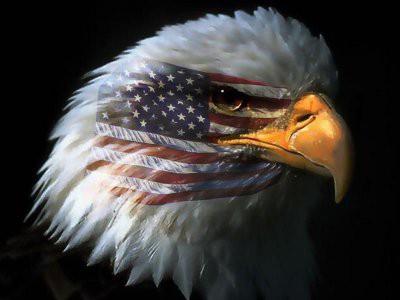
www.VigilanceVoice.com
Tuesday--March
11, 2003—Ground Zero Plus 545
___________________________________________________________
The Morality Of Killing
A Peace Advocate's Sorrow
___________________________________________________________
by
Cliff McKenzie
Editor, New York City Combat Correspondent News
|
GROUND ZERO, New York City, Mar. 11--The "killing
words" just flew out of my mouth, not ill-intended or designed to rub
salt into the sorrowful anti-war wounds of either Jane or the Jesuit
Priest, Father Gannon.
I just said what I believed. There
were words meant to reduce not expand the sorrow of a woman worried
about war. But I was met with shocked, pained, anguished looks.
After the words escaped, I felt as though I had just cut open the
belly of a newborn baby and raised its bloody body over my head in
evil triumph.
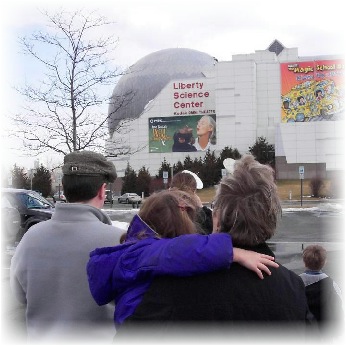 |
|
I was
anticipating the family outing to the Liberty Science Center |
The incident
happened this past Sunday at the Nativity Catholic Church in the East
Village. I am not a regular church goer, but went to
meet with my daughter, wife, son-in-law and three grandchildren.
After church we were heading for the Liberty Park Science Center in
New Jersey where a traveling exhibit of The Magic School Bus was on
display. The four-story Science Center is filled with a host of
fascinating exhibits geared to spark children's imagination and urge
them to explore the world through microscopes and telescopes.
My mind was on the trip, not on the issue of peace
versus war.
I had no intention of thumping war drums or offending
the spirit of peace. That happened by accident.
The victim of my offense--if what I did might be called
that--was Jane, a strong-willed woman who is a major spoke in the
Catholic Worker wheel.
 |
|
The Catholic
Worker was founded by Dorothy Day with the urging and aid of
Peter Maurin |
Launched by social and
political activists Dorothy Day and Peter Maurin in 1933, the Catholic
Worker has hundreds of houses located throughout the United States and
the world. The movement believes in the God-given dignity of
every person. As I understand it, the Worker's mission is to
help homeless, disenfranchised people and uphold the principles of
social justice through peaceful protest. This includes
protesting war as well as injustices to the underprivileged,
marginalized people around the globe. The Worker has no
official affiliation with the Catholic Church, and often defies it by
speaking out on issues the Church may ignore.
My older daughter has been involved with the Catholic
Worker for more than a decade, including serving a stint as managing
editor of its newspaper, the only penny paper left in the United
States. The Catholic Worker newspaper enjoys a circulation of
nearly 100,000 worldwide.
In 1995 there were 134 communities of hospitality
manned by unpaid volunteers (all but three in the United States) where
what member's call " works of mercy" are practiced.
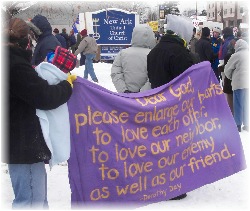 |
|
Catholic
Worker anti-war protestors hold banner with
Dorothy Day statement on Feb 15, '03 |
Unlike most current war
protestors, Catholic Workers perpetually argue for peace.
They aren't "foul-weather" protestors, waiting until some
conflagration such as Iraq pops up on the global radar screen to man
and woman banners and placards
I admire that part of their movement; they walk like
they talk 24/7, 365 days a year.
One of the Worker's members, Kathy, is currently in
Iraq protesting for peace. Early Sunday morning
while researching the news for my daily story, I stumbled across a
picture of her in the New York Times. She was holding up
a peace banner in front of the Canal Hotel where the U.N. weapons
inspectors reside. I blew it up and printed a few copies for my
daughter to give to her friends at the Worker.
While I don't embrace the dogma of the Catholic
Worker, I do respect what they stand for. I believe that
without the right of protest or dissent, there is no freedom in any
nation. Ultimately, I hold their ideals valid--that one day this
earth might be free of war, anguish, poverty and oppression.
But, I'm a pragmatist, and keep my hand on my gun just in case "evil"
has other ideas.
I tend to believe that the Beast of Terror
cannot be prayed into inactivity. Instead, he must be harnessed
and hobbled by violence, if necessary. At this point, I'm
in agreement with surrounding Saddam Hussein with 250,000 troops and
arms to force him to comply with his 1991 disarmament agreement he has
deftly skated on over the dozen years. He's a bully
Terrorist, the kind who likes to amass weapons of mass destruction to
bully his way to power. His defiance of the U.N. and
continued efforts to expand his arsenal of weapons convinces me he
wants to be the King Bully Terrorist. He'd love to have all the
Terrorists in the world beat paths to his doorstep to haggle over
doses of anthrax, smallpox, and even dirty nuclear bombs to be used
against "their enemies."
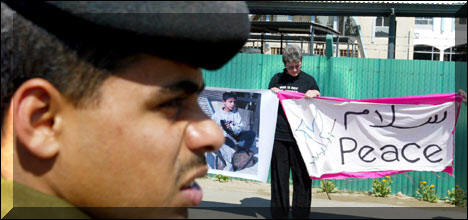 |
|
My daughter's
friend, Kathy, in Baghdad, holding an anti-war banner |
I also see his
demise as a signal to the world of Terrorists that America at least,
and the world hopefully, will not allow the spread of weapons of mass
destruction. I'm for invading Iraq as a message to all
Terrorists that there are no negotiations with Terrorism or its
potential threat. Saddam has proven his ability to attack
other nations to expand his power, stated his goal of ruling the Arab
world, and gassed thousands of his own people, including innocent
women and children.
When he is toppled or abdicates, it will be
a blow to Terrorism worldwide. And while the price of war
might be high, the message it barks to Kim Jong Il and the Osama bin
Laden's of the world is that bullies will be met with swift, deadly
force.
I would prefer war didn't happen, but
I see that if it occurs, the benefactors are the children of the
world. They'll be a little safer from the next Saddam who is
plotting to Terrorize them.
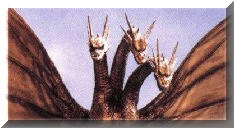 |
|
The Beast of Terror's many heads must be severed |
I believe one
must carry the Sword and Shield of Vigilance and be ready, willing and
able to cut off the Beast of Terror's many heads before his jaws and
claws sink into the flesh of the children, or the helpless.
Biblically, the book of James says "faith
without works is dead." I take that to mean besides praying for
peace, one must also be willing to fight and die for it.
Then there is one other factor that drives
my opinions--I am a trained killer, a former U.S. Marine with more
than 100 combat operations in Vietnam. Perhaps I have seen
the Beast of Terror's face too many times, and witnessed how he can
ravage the innocent despite all the prayers issued in their behalf.
Adding to my past war experience, I
am also a survivor of Nine Eleven. I often awake to the sight of
bodies leaping from the burning buildings at the World Trade Center on
September 11. I recall the rupturing roar of Beast's belly
belching after his feast when the giant buildings fell that day,
crushing life from nearly 3,000 mothers, fathers, grandparents,
uncles, aunts, cousins, brothers and sisters of humanity. When I
awaken to these thoughts, I don't want to fall to my knees and pray.
I grit my teeth and want to settle the score, even though I know
blood-for-blood washes away no sins.
So when Jane came up to me after Mass this past
Sunday to thank me for the 8x10 photo I had blown up of Kathy in
Baghdad, I had no expectations our conversation would end up about
killing, or that I would excitedly praise Jane's relative for being
able to "surgically kill" people and cause her added sorrow.
Catholic Worker people know my background.
They know I am a war veteran who isn't anti-war. They
respect who I am because I do not challenge them, or decry their
efforts to rally against all forms of militarism.
We comfortably co-exist.
As Jane thanked me for the photo of Kathy,
she began telling me she had a relative, a nephew I believe, who was
also a U.S. Marine. She said he was a sniper and had been sent
to the Middle East. As she said the word "sniper," her
face took on a pained, sorrowful countenance. She lowered her
head slightly, as though holding back a gasp from deep within.
I wanted to lift her spirits.
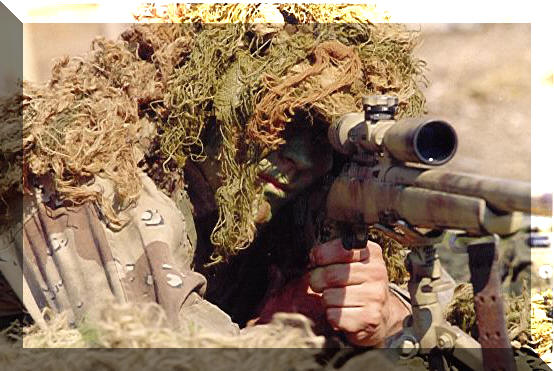 |
|
A Marine
sniper's kills will be " clean." |
"But Jane, that's great...
that he's a sniper. If he kills anyone, he'll know exactly
who he is killing. He'll pick out his target. He won't
kill indiscriminately. His kills will be clean."
No sooner had the words I thought were solace
based slipped over my lips than Jane's face twisted into a death mask.
She gazed at me blankly. The blood rushed to her toes. Her jaw
slackened.
"Oh, no!"
"But that's good Jane. In war, the worst
thought a warrior can have is: 'who did I kill by accident?'
Your nephew won't deliver death by accident. He'll know each of his
targets. That's good, Jane.'"
In my vainglorious attempt to assuage her pain, I was
digging the trench deeper.
"No. No, I don't want to think about it."
Jane held up her hand as though it were a shield defending against my
brass-knuckled tongue. Then she walked away.
I had not planned add to Jane's burden.
My intent was to ameliorate her concerns not enflame them. In my
rush to make her feel better, I forgot that killing--just or
unjust--was an affront to the mental, emotional and spiritual
framework of Jane and all Catholic Workers.
I didn't get a chance to tell her why I believed
a sniper in war had the best chance of being the most "moral" of
killers.
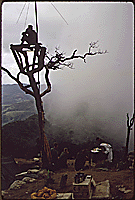 |
|
Marine on an
observation tower scouting a "discriminate" kill |
As a Marine "grunt" I had
my "moral killing" experiences. They are unique to those who
have been in combat, and, after my experience with Jane, I realize how
important they are to my personal well-being.
My "moral killing experiences" involved
situations where I chose not to kill, even though I could have.
In one case we were hunting V.C. in the dense
jungle. We mounted a cliff. Below was a small river.
Suddenly, three figures burst from the underbrush. Immediately,
a barrage of fire erupted. I raised my rifle to fire and
realized that one of the figures was far too small to be an adult.
I yelled for the others to cease fire. It turned out the figures
were a mother, father and small child. Normally, the killing
instinct overpowers all others. For some reason the
child's shadow set off some alarm, enough to save the family.
In another case we flushed a Vietnamese from the brush
deep in enemy territory. The free-fire zone was in effect.
The "free fire zone" translated to: "if it moves, kill it!"
The Vietnamese startled us as he broke from
the brush and rushed toward the river. He wore black
pajamas, the uniform of most Vietnamese farmers and Viet Cong, making
it almost impossible to distinguish the combatants from
non-combatants.
The fleeing Vietnamese dove into a swollen
river fed by monsoon rains. His arms and legs flailed wildly as
he frenetically swam at an angle across the turgid river, about the
color of a Starbuck's chocolate mocha.
In the heat of battle, you are trained to
shoot first and ask questions later. If you don't, hesitation
can mean death. So you err on the side of caution, and sometimes
that err includes killing the innocent. We had no idea if
this man was a V.C. or not. Fleeing could mean he was just
scared or we had flushed out a potential sniper.
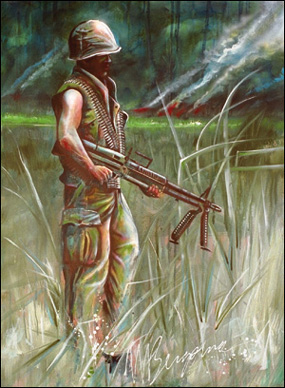 |
|
"if it
moves...kill it." |
As the man
swam for his life, I raised my M-14 to my shoulder, leveled my
sights and started to squeeze the trigger. I'm an expert
marksman. It would have been a good shot. Around me,
others were firing madly at the man who thrashed through the water at
a speed that would have probably set a unbeatable world record were it
being recorded.
As I was about to apply the final ounce of
pressure on the trigger, something held me back. I relaxed my
trigger finger. Everyone else was firing at the man.
Bullets kicked spouts of water all around the Vietnamese who was
miraculously evading the wall of deadly lead spewing at him
He swam harder and faster with each shot.
I slowly lowered my rifle and watched.
Virtually thousands of rounds were being pumped at him as more Marines
joined in the "turkey shoot." Then something bizarre
clicked in my mind.
I found myself cheering him, as
though he were in a great race with death, which he was, and I was his
head cheerleader. I wanted him to escape. By now
there must have been twenty to thirty other Marines emptying
their weapons at him. As he survived each fusillade, I
cheered louder and louder. Soon, a few others put down
their rifles and joined me in my cheers.
I continued with my little cheerleading
squad rooting him on. When he hit the steep bank about 100 yards
away, the scene of his escape from the water was from a cartoon.
His frail, bony body seemed to levitate out of the water. His
bare feet pumped as he switched from Olympic Gold Medal swimmer to
Olympic Gold Medal 100-yard sprinter. He clambered up the
cantilevered bank as though shot from a trampoline.
In a flash he was on the ledge of the bank,
hunching, ducking, dancing, weaving as bullets cracked between his
legs, past his ears, near his feet. Then he disappeared into the
verdant jungle, a small black blotch swallowed by the green of life.
There was one final burst of fire followed by silence.
In a bizarre way, I helped deny the
Grim Reaper of War another victim. Part of my reason was, I
wasn't into shooting people in the back. And, I wasn't into
racking up another notch on my rifle to compare it to others' rifle
stocks. I had no collection of ears on my gun belt. I felt
no compunction about cheering him on for we hadn't been fired upon and
there was no indication he was bearing arms. I gave a salute to
the jungle where he had disappeared and trudged on to finish the
sweep.
 |
|
I want to ask
Vietnamese children if their grandfather told them 'the story'. |
Whenever I see
a young Vietnamese these days, in the back of my mind I want to ask:
"Did you father or grandfather ever tell you a story about a very fast
swim he took one day in Vietnam?" But I don't. I
just like to remember I chose not to fire at him. But I always
wonder if he tells the story of his escape from death.
War's memories don't fade. I can see
every face of those I caught in my sights--those who died as well as
those whom I chose not to fire upon for whatever reason. War's
ugliness is like Super Glue, it sticks to the soul with an immortal
bond.
I was always thankful I fought on the
ground, face-to-face with the enemy. The majority of the time I
knew who I was shooting at. I always held the choice of pulling
the trigger or not. I took full responsibility for my "kills."
Unfortunately, not everyone in war enjoys
the "right to kill justly." Pilots and artillery officers don't
get to look their targets in the eye. They cannot see what they shoot
at. They cannot tell if their targets are enemy or civilians,
even though they have forward observers who relay information to them
about the target zone. Their death of others is primarily
indiscriminate. They never know for sure whether they
killed "justly" or "unjustly," if such a thing is even possible.
That's why I got so excited when Jane told
me her nephew was a sniper. A sniper has maximum control over whom he
kills or chooses not to. With powerful scopes and a
shooting skill unmatched by most, the sniper knows the pores on the
face of his victims. He can decide with clarity if the target is
an "enemy" or not. Thus, he can perform "just kills."
My goal had been to assuage Jane's
concerns. I forgot her comment to me was one of blanket
pain--that whether her relative was a sniper or chaplain's assistant,
it didn't matter. He was dressed in military uniform, pledged to
fight and kill. Whether it was killing an ant or an
enraged elephant, it didn't matter. Killing was bad to Jane and
war was its ultimate excuse.
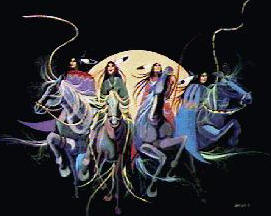 |
|
Jane is a
Warrior for Peace |
Jane, I
believe, knew I meant no intentional harm by my comments. She's
a Soldier of Dissent, a Warrior For Peace. She's been in many
battles where her beliefs buttressed against the opposition.
Over many years as a peace activist, she has chosen to deny all forms
of violence, regardless of attempts to convert them into "just" or
"unjust" niches. She is also tolerant to reality.
She understands that others have the right to hold opposite views,
even if those views fly in the face of all hers. She and I have
been friends for over a decade, even though we stand at different
poles of the peace-war spectrum. But I did feel badly.
Following the faux pax with Jane, I went to
Father Gannon who runs Nativity Church. He was standing by the
pews, finishing a conversation with a parishioner. When he
finished, I told him I shared the conversation I'd had with Jane and
told him I thought I had made a mistake telling Jane what I did.
"Well, your intent was good, but the effect may
not have been."
I thought about what he said. Father
Gannon is a wonderful man, struggling to keep his parish alive as the
Catholic Church whittles away at closing down as many "non-productive"
churches as possible. His parish is fortunate to also
double as a Jesuit house adding value to its remaining open.
His "flock" also includes a large number of Hispanics from the East
Village, and is sandwiched between Mary House and St. Joseph House,
two Catholic Worker bastions and headquarters for the publication of
the Worker's worldwide paper.
I knew little about the peace movement
before my daughter became active in it. At first, I
thought it was a bunch of left-wingers spewing venom about the
ugliness of those who fought wars. I still remember being
spat upon by such protestors after my return from Vietnam, and always
have been gun-shy of "peaceniks." The radical element tried to
heap guilt and shame on us, as they are currently trying to make
President Bush the "evil one" and Saddam Hussein the "tragic hero" of
American oppression. I can never fathom such
unfairness, but that is their right, so I swallow my thoughts.
The Catholic Worker, however, doesn't fall in
that category. Over the years I have fallen in love with
the Vigilance of the Catholic Worker society. They
struggle each and every day to have their Voice heard, even when there
are no wars. They stand vigils weekly as religiously as
the postman delivers. Their Voices are a silent cry in a
cacophonous wilderness. And they seek no glory. They
don't run in front of television cameras, or have righteous
leadership. They are doers not barkers. They live
daily life in protest, they don't just rent the clothing of protestors
when the fires of war rage.
I often view Jane as the Catholic Worker's
Sergeant Major of Peace Vigilance, even though there is no leadership
structure in the organization. It enjoys anarchical structure.
Jane is a strong woman both in size
and Voice; her opinions ring with a veracity few hawks could ever hope
to drown. She walks as though the yoke of the world's
burdens were somehow slung over her shoulders, but yet will break into
a warm, gentle smile upon seeing you. Her questions are about you,
your life and the joys of living. She seeks not to sink
the sword of her beliefs in anyone's side.
However, I felt I had thrust unwanted sorrow into
Jane's side.
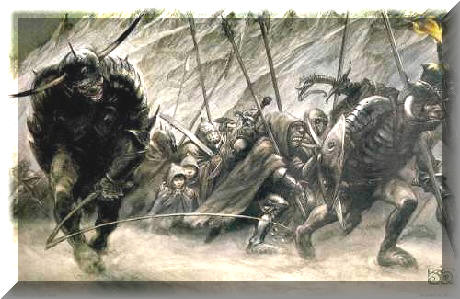 |
|
The Beast of
War kills, rapes, pillages, plunders with abandon |
In my own way,
I think I wounded Jane by default not intent. It was my
view of war that provided the cutting edge. I see it as the
lesser of many evils, not as evil itself. I know the Beast
of Terror is ruthless, and unless he is challenged to a duel, he will
rape, pillage and plunder with abandon. I've seen him
ravage the weak and innocent. I've been with him in battle, and
I've almost become him at times when killing for killing's sake took
hold.
What I wanted Jane to know was that her relative
had the least likelihood of becoming a Beast of Terror.
Snipers, I wanted to shout, kill with precision not wantonness.
But my excitement to mollify her sorrow only
fueled it. I was oil and she was water--at least on the
killing issue.
Our mutual respect and admiration for each other
has not been damaged, hopefully, by my elation over her relative's
role in war. But there has been a benefit to it.
It was a wake up call to me that war has a
Terrorizing effect on those who oppose it, and especially to those
related to the warriors who fight it.
Jane, I'm sure, will cringe every day
if war breaks out, trying not to think of what her nephew is doing.
She will be drawn closer to war's horror, for she will know a young
man whom she is linked to by blood. She will pray he doesn't
learn the worst lessons a man can ever learn in war--how to kill
another without blinking an eye.
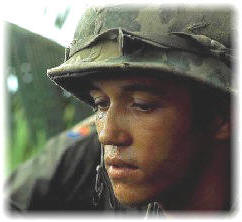 |
|
There is Hope
in the madness of war. A tear falls from this American
GI's soul. |
War cannot
afford a conscience amongst its warriors. It extracts that
from the warrior, enabling him or her to kill without thought, without
cogitation of killings' "rightness" or "wrongness."
War strangles the moral nature of a human being.
It suspends the warrior in a web of amorality, sufficient for the
warrior to endure the flow of blood that spills upon the battlefield,
and to stomach the stench of the dead who may include the innocent as
well as the combatants.
War kills human innocence. It always
has and always will. It is the sad part of war to see young men
and women eagerly sight another human being and squeeze a trigger that
ends all life's hope for the victim.
But there is some hope in the madness of
war. There will be times when each warrior can choose not
to shoot. I had forgotten the importance of those moments until
my conversation with Jane. They reminded me I had not lost all
my humanity.
I suppose I wanted her to know her nephew
will have such moments when he chooses not to kill.
Jane also reminded
me that the cries for peace are worthy. It is easy for me
to discount them and to rail on about the need to quash the Beast of
Terror before he gnaws the bones of the Children's Children's
Children.
Jane reinforced that without people who
have Courage and Conviction like those of the Catholic Worker,
all conscience might die.
I hope those who fight the next war will preserve
some scrap of conscience. Maybe they'll be reminded that they don't
have to kill anything that moves and that they can take a moment from
killing to know they are not the Beast they hunt.

Mar. 10--The Tragedy Of Vigilance
©2001
- 2004, VigilanceVoice.com, All rights reserved -
a ((HYYPE))
design

©2001
- 2004, VigilanceVoice.com, All rights reserved -
a ((HYYPE))
design

|
|
|